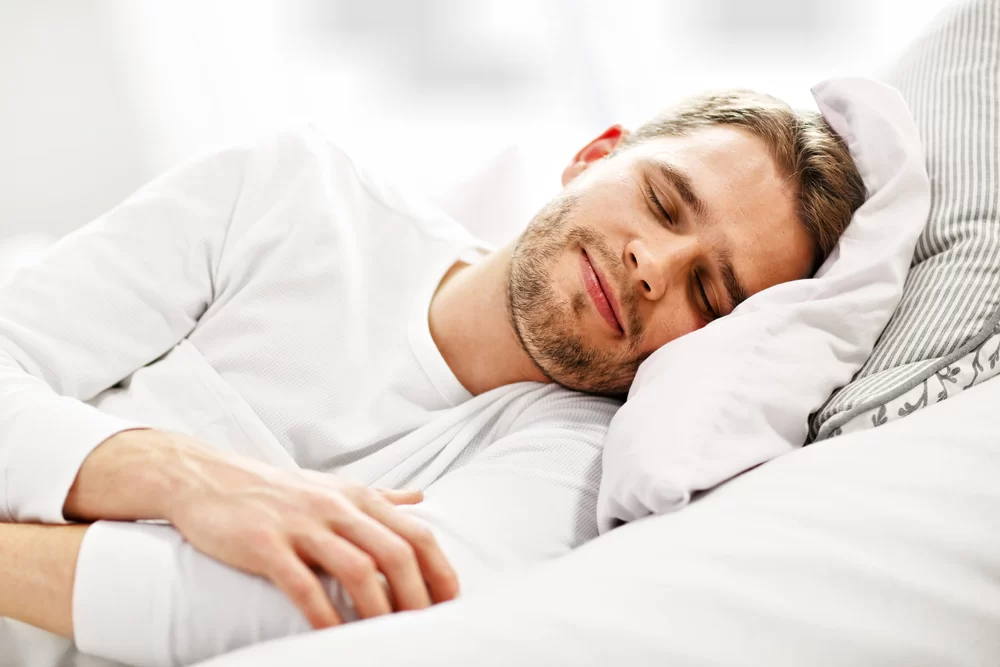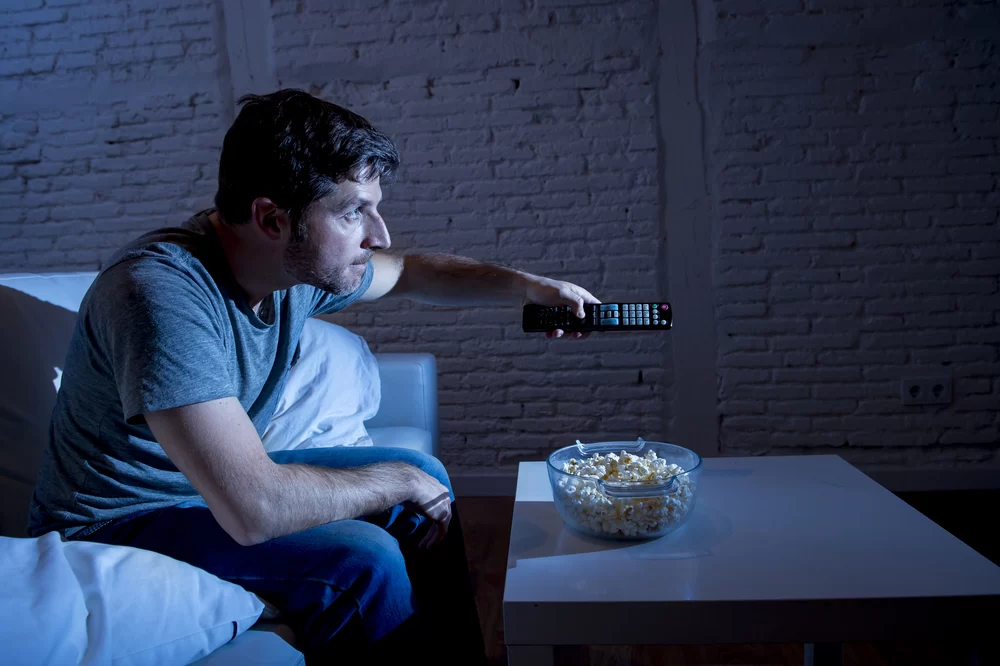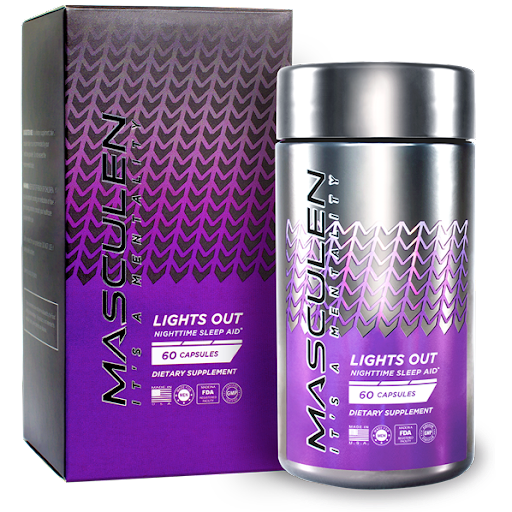Tips for Sleeping – How to Fall Asleep Faster and Sleep Better
01/13/2023

Not only is insomnia incredibly frustrating, it can decrease your productivity and even negatively impact your overall health.
If you are one of the estimated 50 to 70 million American men who have sleep difficulties, you may be tempted to turn to prescription sleep medicine.
While sleep medicine may offer a temporary solution, most experts agree that you should not use it in the long-term. In addition to the long list of potential side-effects and the high risk of developing a dependency issue, sleep induced with sleeping pills is less restorative than naturalistic sleep.
So, if you are ready to start falling asleep faster, as well as enjoying a better overall quality of sleep, it’s time to step up your sleep game! Follow these tips for sleeping and you’ll wake up rested and ready to take on the world!
The Top Four Tips for Sleeping
1. Cut the Screen Time Before Bed

After a long day, it’s always tempting to sit back and clock a bit of time in front of the TV. Even when you head to bed, it’s easy to mindlessly scroll social media on your phone.
While these activities may seem harmless, the truth is, they can actually prevent you from falling asleep and even affect the quality of your sleep. This is because back-lit screens, like smartphones, tablets, laptops, as well as LED TV screens, emit short-wavelength enriched light, or blue light as it is more commonly known.
Exposure to this type of light has been shown to reduce and delay the body’s natural production of melatonin. This means you won’t feel as sleepy if you stare at a screen before bedtime!
While some men are more impacted by this than others, studies have shown that there is a direct link between screen time and sleep latency. The SleepFoundation.org offers a detailed explanation of How Electronics Affect Sleep.
Put simply, staring at a screen before you head to bed, and even while lying in bed, will make it harder to fall asleep. Even when you do fall asleep, your sleep quality will be reduced, so you will likely wake up still feeling tired.
Make your bedroom a screen-free zone at night. You also need to break the habit and stop staring at screens at least an hour before bed. Pick up a book, meditate, stretch, or find something else to do before bed!
2. Watch What You Eat and Drink

A healthy, balanced diet is one of the best things you can do for your body and mind. You might be surprised to learn that cleaning up your diet can actually help you fall asleep faster and enjoy more restful sleep.
In addition to improving your diet by reducing processed foods and increasing the amount of nutritious, whole foods you consume, it is also important to avoid drinking and eating certain things in the early afternoon.
Obviously, you want to limit caffeine intake later in the day if you struggle to sleep. Not only does this mean putting the coffee cup down, it means trimming caffeine-rich soda, like Diet Coca-Cola in the late afternoon. Chocolate, tea, energy drinks, pre-workout supplements, and even decaffeinated coffee all contain caffeine, so you should cut them out at least 4 hours before you go to bed.
It’s also important to avoid sugar before bed and meals high in saturated fat and processed carbohydrates, as these energy-rich foods can cause sleep disruption.
3. Avoid Stressful Thoughts and Situations Before Bed
I know, this is easier said than done. Even though it’s impossible to avoid stress altogether, there is plenty you can do to limit the amount of stress you experience at night.
For starters, leave those work emails alone before you hit the hay. They can wait until tomorrow when you can tackle the day’s tasks with a well-rested, clear head. The same goes for any anxiety-inducing tasks or thoughts you are dealing with. Finances stressing you out? Set aside time in the afternoon or early evening to concentrate on your bills, investments, or bank balance.
Ideally, you will leave at least 2 hours before bed where you condition yourself to avoid tasks and thoughts that make you feel stressed, anxious, or uneasy. Not only can focusing on these tasks and thoughts before bed make it difficult to fall and stay asleep, you will be much better equipped to deal with them after a good night’s rest.
You can even consider meditating before bed, or practicing other relaxation techniques that are designed to help you avoid overthinking before bed.
SleepAdvisor.org has a useful guide to the many benefits of meditating prior to sleep – Should You Meditate Before You Go to Bed?
4. Try a Natural Sleep Supplement, like Lights Out – Nighttime Sleep Aid

While prescription sleeping pills can cause a whole host of problems, sleep supplements that contain natural ingredients can be incredibly beneficial.
Lights Out Nighttime Sleep Aid is specifically designed to help men get a more restful sleep. Experience the benefits of falling asleep faster and staying asleep longer. You can avoid the frustration of tossing and turning in bed at night and wake up with refreshed mental clarity and the drive to take on the day.
Natural ingredients, like L-tryptophan and melatonin help you sleep faster and deeper, while hops and valerian improve sleep quality and duration.
Fall asleep harder, sleep longer, and recharge quicker so you can keep winning while you are awake!
Final Words
It is time to start taking healthy sleep habits seriously! There are endless reasons why getting a proper night’s sleep is important, so it’s up to you to do what’s necessary to ensure you get the benefits more restful sleep can offer.
The tips outlined above are proven ways to get the results you need and build good sleep habits to beat insomnia and get better sleep. You can also improve your sleep quality by taking the time to improve your sleep schedule. Our informative sleep schedule guide is packed with useful information and tips – How to Fix My Sleep Schedule – Ways to Reset Your Rest.

 Back to Blog
Back to Blog